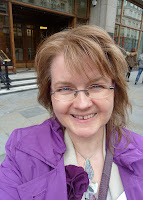 |
| Rosy with the East Anglian Book Award for Ninepins |
Sometimes, when the idea for a novel has suggested itself to me, what has emerged first has been character: the figure of a woman, and snatches of her story. But recently - in the case of both of my last two books - it has been before anything else a landscape which has taken hold of my imagination.
For a writer - or for this writer, at least - no landscape ever stands alone, a static painting in a frame. It lives and breathes and is alive with possibilities. And for me, in particular, it is intimately linked with theme.
Take my latest book, Ninepins. It is set in the bleak, windswept flatlands of the Cambridgeshire fens. This is a land which should by rights be under water, reclaimed by man from a vast stretch of marsh which stretched south and westwards inland from the Wash until the seventeenth century. The water lurks constantly just below the surface of the black, peaty soil, waiting only for a prolonged spell of rain to rise up and take back its own. You couldn't set a light romantic comedy in the fens. This is the landscape of Graham Swift's Waterland and Dorothy L. Sayers' The Nine Tailors: a country swirling with murky undercurrents. It is no coincidence that Ninepins is the darkest of my novels to date, nor that it is permeated by a sense of the elements: of fire and water, earth and air, of breath and breathing, of flooding and drowning.
My previous novel, The Tapestry of Love, was set against quite a different backdrop, though equally untamed. Its narrative plays out amidst the rugged beauty of the Cevennes mountains in the French Massif Central. This is a landscape of wild, wooded uplands, split by deep valleys on whose slopes cling tiny settlements, almost as ancient as the rock from which they are cut. No coincidence again that the book I chose to set there explores themes of isolation and loneliness but also of belonging, and what it means to put down roots in an alien place; it is a story of the redemptive power of family and friendship and community.
If setting and theme are closely interwoven, there remains the challenge of conveying that setting, that pervading atmosphere of place, from the author's to the reader's mind. How is this to be achieved without describing the scene in compendious detail, itemising each leaf and blade of grass?
One technique is the broad brush approach: the application of bold, outline strokes to sketch out the overall shape of the landscape, to give a sense of its defining features. Here, from Ninepins, is a passage which shows the big picture: the sky, the banks and waterways and flat farmland between, and the distant city beyond.
'When she and Simon first came here - before the arguments, before Beth - they used to stand here side by side sometimes, neither speaking nor moving, and watch the sky slowly bleed from grey through mauve to black. There was so much sky at Ninepins. From here on top of the dyke, looking out across the lode, across the empty fields beyond, it seemed to dwarf the earth, vast and tall and toppling. On days like today, when cloud was sparse, it held a quiet luminosity which lingered even after the sun was gone; the lode and banks were lit by a soft, persistent glow which seemed to come from around and within as much as from above, outshadowing the orange smudge of Cambridge on the southern horizon.'
Less obvious, perhaps, but equally effective in my experience, is the opposite approach: working not from broad outline but from small, selected details. Switch the focus away from the general view and depict instead, at close quarters and minutely observed, some characteristic element from which the reader can infer the nature of the whole. Take this, again from Ninepins:
'It was a movement, now, that caught her attention; a sudden streak, low over the winter wheat, that was gone before she truly saw it. It was no more than a tick, a dash. Could movement have a colour? If so, she sensed that its shade was dark - though the field itself was dark, too, black soil between green shoots, so there was nothing to differentiate what she saw but the simple fact of motion. She knew at once what she had seen. That dizzy speed, that plunging arc, had been missing from the landscape since last summer's end. It was the swallows, back again; it was the spring.'
Rosy Thornton's website is here.
Ninepins is at Amazon here
The Tapestry of Love is on Amazon here
My novel set in France, The Chase, will be re-released on Kindle early in the New Year.
Booking is now open for my upcoming Fictionfire Focus Workshops and Day Courses see my website for details.







.jpg)























